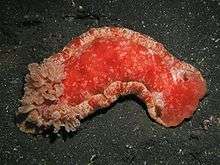Hexabranchus
Hexabranchidae is a monotypic family of colorful nudibranchs (often called "sea slugs") which contains only a single genus Hexabranchus, with two species, and has no subfamilies.
| Hexabranchidae | |
|---|---|
 | |
| Hexabranchus sanguineus, 90 cm in length, photographed at night in Bali | |
| Scientific classification | |
| Kingdom: | |
| Phylum: | |
| Class: | |
| (unranked): | clade Heterobranchia clade Euthyneura clade Nudipleura clade Nudibranchia clade Euctenidiacea clade Doridacea |
| Superfamily: | |
| Family: | Hexabranchidae |
| Genus: | Hexabranchus |
| Diversity[3] | |
| 2 species | |
This family is one of the many families of dorid nudibranchs in the suborder Doridina, named after Doris, who was a sea nymph in ancient Greek mythology.
The genus contains one of the largest known species of nudibranch in the world, H. sanguineus, which grows up to or exceeding 40 cm in length.[4] This species is known to use chemical defenses derived from the sponge it eats and use the chemical compounds to defend itself from potential fish predators.[5]
Species
There are two species within the genus Hexabranchus:[3]
- Hexabranchus morsomus Ev. Marcus & Er. Marcus, 1962[3]
- Hexabranchus sanguineus (Ruppell & Leuckart, 1828) - synonym: Hexabranchus praetextus Ehrenberg, 1828 - type species[3]
gollark: I'm challenging, generally, your "who cares about code quality" stance.
gollark: Things can work while being awful. See: 3d6's personal projects.
gollark: If code is not good and nice and all that, then nobody can or will want to develop on it.
gollark: It does actually.
gollark: That's not a good argument.
References
- Bergh R. (1891). "Die cryptobranchiaten Dorididen". Zoologische Jahrbücher. Abteilung für Systematik, Geographie und Biologie der Tiere 6: 103-144.
- Ehrenberg C. G. (1828–1831). Symbolae physicae animalia evertebrata exclusis insectis. Series prima cum tabularum decade prima continent animalia Africana et Asiatica. Decas Prima. In ‘Symbolae physicae, seu Icones adhue ineditae corporum naturalium novorum aut minus cognitorum, quae ex itineribus per Libyam, Aegyptum, Nubiam, Dengalam, Syriam, Arabiam et Habessiniam. Pars Zoologica, 4.’ Hemprich F. G. & Ehrenberg C. G. (eds.) Pages unumbered. (Officina Academica: Berlin.) Dates of publication: pls 1–2 [1828], text [1831].
- Valdés Á. (2002). "How many species of Hexabranchus (Opisthobranchia : Dorididae) are there?". Molluscan Research 22(3): 289-301. doi:10.1071/MR02012, PDF.
- http://www.seaslugforum.net/hexasang.htm
- Pawlik, JR; et al. (1988). "Defensive chemicals of the Spanish Dancer nudibranch, Hexabranchus sanguineus, and its egg ribbons: Macrolides derived from a sponge diet". Journal of Experimental Marine Biology and Ecology. 119: 99–109. doi:10.1016/0022-0981(88)90225-0.
This article is issued from Wikipedia. The text is licensed under Creative Commons - Attribution - Sharealike. Additional terms may apply for the media files.